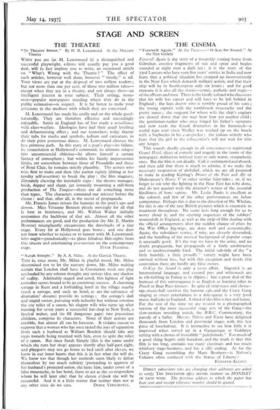STAGE AND SCREEN
THE THEATRE
"In Theatre Street." By H. R. Lenormand. At the Mercury ' Theatre WHEN you are (as M. Lenormand is) a distinguished and successful playwright, editors will usually pay you a good deal, will in fact implore you to write, an occasional article on " What's Wrong with the Theatre ? " The effect of such articles, however well done, however " timely," is nil. Your views are put at the disposal of two million readers ; but not more than one per cent. of those two million takes- eicept when they are in a theatre, and not always then—an intelligent interest in your subject. Their setting, more- over—popular newspapers standing where they do in the public estimation—is suspect. It is far better to make your criticisms in the medium with which they are concerned.
M. Lenormand has made his coolly and on the whole good- naturedly. They are therefore effective and exceedingly enjoyable. Satire in England has of late made a mesalliance with class-warfare. Ideologies have had their usual levelling and dehumanising effect ; and our iconoclasts today thump their tubs for masks and symbols, tedium and caricature, to do their prim portentous dance. M. Lenormand chooses the less primrose path. In this story of a poet's play—its failure, its resuscitation at Hollywood's command, its ultimate relapse into uncommercial oblivion—he allows himself a certain fantasy of atmosphere ; but within his faintly impressionist limits, set somewhere between those of Pirandello and those of Rene Clair, he remains strictly plausible. The actress who tries first to make and then (the author rightly jibbing at her tawdry self-assertion) to break the play : the film magnate, illiterately chewing the inevitable cigar : the theatre manager, brisk, dapper and sharp, yet inwardly mourning a still-born production of The Tempest—these are all something more than types. The characters command our interest before the theme : and that, after all, is the secret of propaganda.
Mr. Francis James misses the humour in the poet's ups and downs. Miss Vivienne Bennett pleads movingly for all that is best in histrionics, and Mr. Wilfrid Walter skilfully anatomises the backbone of that art. Almost all the other performances are good, and the production (by Mr. E. Martin Browne) triumphantly circumvents the drawbacks of a tiny stage. Every hit at Hollywood goes home ; and one does not know whether to rejoice or to lament with M. Lenormand, who ought—paradoxically—to glean fabulous film-rights from this sincere and entertaining post-mortem on the contemporary














































 Previous page
Previous page